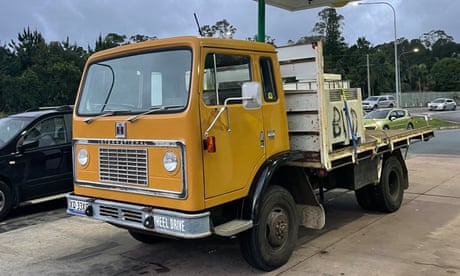- by foxnews
- 08 Apr 2025
Australia’s diesel price spike causes rethink in reliant regional areas
Australia’s diesel price spike causes rethink in reliant regional areas
- by theguardian
- 09 Dec 2022
- in news

Nick Holliday's 1973 International Acco truck sat dormant out the front of his farm for years, as a decoration collecting dust. But diesel price rises have given the old truck a new lease of life.
"We have had to rethink the ways we do things," Holliday said.
"Including, bizarrely, we've had this vintage six-tonne truck that is a beautiful outfit. It's like a marketing vehicle for the farm. But now, because unleaded petrol is 60 cents a litre cheaper than diesel, it's actually now cheaper to run a very inefficient old petrol truck than a modern diesel dual cab."
Holliday has consolidated all of his deliveries from his mixed livestock farm in Cedarton, Queensland into a single day, to reduce fuel costs. This has meant overcoming scheduling difficulties with his customers and even beginning to "car pool" goods with other farmers.
"At one level is a pretty good thing, because we burn less hydrocarbons."
Global diesel prices have been steadily increasing throughout the year due in part toRussia's invasion of Ukraine and the subsequent increased competition for fuel. In the past week, the average price of diesel was $2.24 a litre compared with $1.74 a litre of petrol.
This is having a particular effect on regional areas and industries where diesel utes, trucks and machinery are common, particularly as harvest comes into full swing.
Rod Gribble, from Australian Custom Harvesters which represents harvest and sowing contractors, painted a more dire picture. He said the continued rise in fuel prices, coupled with fertiliser shortages had the potential to push the industry to collapse.
"The growers are the people in the primary production chain and they're the ones that always carry the cost, until eventually what's going to happen is people will say, 'well food production is going to be too expensive, so we'll just go somewhere else,'" Gribble said.
He also said decades of inconsistent government policy had meant regional communities had been left without affordable fuel or viable alternatives.
"Food security is totally related to fuel security. People need to understand how vulnerable we are. The vast majority of people have no idea where food comes from. For them it just comes out of Coles or Woolworths," Gribble said.
National Farmers Federation chief executive, Tony Mahar, said the price of diesel would add to the financial burden of farmers. He called on government to work closely with industry to limit the impact and flow on to all Australians.
"For some farmers, the spike in input costs have been somewhat cushioned by good seasonal and market conditions, but others are in a much worse predicament where they have put in the most expensive crops on record and floods have wiped out potential returns and left behind huge damage bills," Mahar said.
Holliday would like to see more creative solutions when it comes to fuel policy.
"Whether that's more government support for electric cars or more support for people collaborating on transport logistics, big picture solutions for our farm in our community, not just Band-Aids," Holliday said.
Fiona Williamson, from the Pyrenees shire in Victoria, said the fuel shortage was also having a social impact. She has limited the amount of trips to see her son, who lives an hour away and has started skipping social gatherings.
"I just can't travel sometimes, as much as I want to be there. It's just not something that's viable at the moment," she said.
Williamson has long considered getting an electric or hybrid car but has been dissuaded by the long wait times and the significant costs of setting up a solar and battery system.
"Diesel would probably be the biggest cost especially when you consider there is no public transport here - there's two buses a week. They don't come back on the same day, they kind of go one way."
"If I had an electric car with a solar system and a battery, I wouldn't think twice about where I go, but I can't afford to do that."
- by foxnews
- descember 09, 2016
Ancient settlement reveals remains of 1,800-year-old dog, baffling experts: 'Preserved quite well'
Archaeologists have recently unearthed the remarkably well-preserved remains of a dog from ancient Rome, shedding light on the widespread practice of ritual sacrifice in antiquity.
read more


